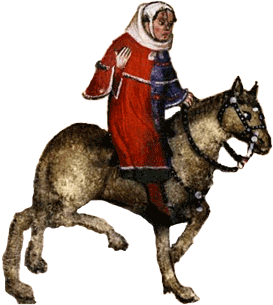|
|
|
|
 |
to Chaucer's Man of Law |



A SERGEANT OF THE LAWE, war and wys,
That often hadde been at the Parvys,
Ther was also, ful riche of excellence.
Discreet he was and of greet reverence;
He semed swich, his wordes weren so wise.
Justice he was ful often in Assise,
By patente and by pleyn commissioun:
For his science and for his heigh renoun.
Of fees and robes hadde he many oon;
So greet a purchasour was nowher noon.
Al was fee symple to hym in effect,
His purchasyng myghte nat been infect.
Nowher so bisy a man as he ther nas,
And yet he semed bisier than he was.
In termes hadde he caas and doomes alle
That from the tyme of kyng William were falle;
Ther-to he koude endite and make a thyng,
Ther koude no wight pynchen at his writyng;
And every statut coude he pleyn by rote.
He rood but hoomly in a medlee cote.
Girt with a ceint of silk with barres smale;
Of his array telle I no lenger tale.
|
310
315
320
325
330
|
[AJ Notes:]
309. Sergeant of the Law, a barrister of the highest order. For example, all judges
of the Court of King's Bench and the Court of Common Pleas
before the 19th century were Serjeants-at-law.
war, careful; prudent.
310. Parvys, the Porch of St. Paul's Cathedral, where lawyers would meet.
312. Discreet, morally discerning.
of greet reverence, highly respected.
313. semed swich, seemed such.
314. Justice... in Assise, a judge in Assize.
315. patente, royal patent; royal charter.
pleyn commissioun, full authority.
316. science, learning; knowledge.
heigh renoun, high renown, i.e. excellent reputation.
317. fees and robes, monetary income and income in robes, i.e. items of clothing.
many oon, many a one; several.
318. purchasour, buyer of land.
319. fee symple, fee simple; the most absolute possession of a title to a piece of real estate.
The implication seems to be that even when the parcel of land he purchased was not
fee simple, his skill as a lawyer would make it so in effect.
320. myghte nat been infect, could not be invalidated.
321. nas, ne was; was not.
323. In termes hadde he, he had written records.
caas and doomes alle, all the cases and their judgments.
324. were falle, had befallen; had taken place.
325. Ther-to, in addition to which.
endite and make a thyng, compose and draw up a document.
326. pynchen at, quibble with.
327. pleyn by rote, repeat by heart.
328. rood, rode.
hoomly, homely; i.e., simply dressed.
medlee cote, multicolored coat.
329. ceint, sash.
barres smale, narrow stripes.
Source:
Pollard, Alfred W., ed. Chaucer's Canterbury Tales. Vol I.
London: Macmillan and Co., Ltd., 1907. 16-17.
 | to Chaucer's Man of Law
|

|
to the Canterbury Tales
|
 |
to the Works of Geoffrey Chaucer |
Copyright ©1996-2023 Anniina Jokinen. All Rights Reserved.
Created on October 29, 1998 by Anniina Jokinen. Last updated on February 5, 2023.
|
|
|